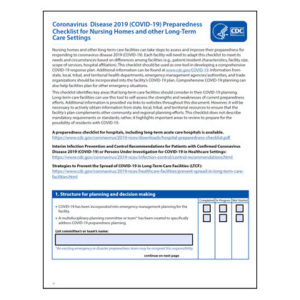An Experimental Drug Seeks to Stop COVID-19 Outbreaks in Nursing Homes

Myron Cohen, M.D., director of UNC’s Institute for Global Health and Infectious Diseases
The COVID-19 pandemic has proven to be particularly deadly in nursing homes. The New York Times reports that 7% of the United States COVID-19 cases have occurred in homes. Nursing home residents also have many preexisting conditions, with the virus being more fatal in people over age 60 and other complications, like asthma and respiratory illnesses, increasing the chance of the disease being fatal.
According to data, senior care facilities experience a 16% fatality rate, while the nationwide fatality rate is much lower at 3%. As of September 16th, 40% of all COVID-19 deaths have occurred in nursing homes and long-term care facilities.
American pharmaceutical company Eli Lilly and Company has partnered with the National Institute of Allergy and Infectious Diseases (NIAID) to address how to best prevent COVID-19 in senior care facilities. With a phase 3 clinical trial underway, this new drug could potentially save the lives of both residents and staff.
LY-CoV555 Clinical Trial
The clinical trial assesses the safety and effectiveness of LY-CoV555, an antibody against SARS-CoV-2, the virus that causes COVID-19. LY-CoV555 was identified and developed from a blood sample from a U.S. patient who had recovered from COVID-19. Lilly scientists developed the antibody in just three months. It works by blocking the virus from attaching and entering cells, and this action may be able to prevent and treat COVID-19.
The trial is expected to enroll 2,400 participants at long-term care facilities throughout the country. Participants will consist of both residents and staff who live or work at a facility where a person has been diagnosed with COVID-19. The trial will evaluate how this drug helps to prevent SARS-CoV-2 and COVID-19 infections in these higher-risk settings, where COVID-19 is already confirmed to have been present. Testing will evaluate the effectiveness of a single dose of LY-CoV555 in reducing infection over a four-week period. Complications through an eight-week period will also be observed.
Conducting a National Clinical Trial
Responding quickly to facilities across the country isn’t an easy task, and Eli Lilly created customizable mobile research units for this reason. Each unit features an RV that has been retrofitted with mobile lab equipment. The RV is paired with a trailer truck that delivers supplies, allowing staff to create on-site infusion clinics.
Because many of these senior care facilities don’t typically conduct clinical trials, mobile research unit staff will also be present at the facilities to assist with the trials. As outbreaks occur across the country, these mobile research units can quickly deploy, starting clinical trials promptly.
“The mission of the COVID-19 Prevention Network is to conduct Phase 3 vaccine and monoclonal antibody efficacy studies for the prevention of COVID-19,” explains Myron Cohen, M.D., director of UNC’s Institute for Global Health and Infectious Diseases and a CoVPN leader. “We’re excited to partner with Lilly to determine whether LY-CoV555 can prevent or mitigate progression of COVID-19 infection in this vulnerable population that has been greatly impacted by this virus.”
How to Participate in the Clinical Trial
If you have recently learned of a staff member or resident who has tested positive for COVID-19, your facility may be able to participate in this study. Call 1-877-285-4559 or email covid19potentialsite@lilly.com for more information about participating in the trial. The Lilly Trial Guide also provides details about all of the company’s COVID-19 trials.

Paige Cerulli is a contributing writer to i Advance Senior Care.
Related Articles
Topics: Clinical , Featured Articles , Infection control










